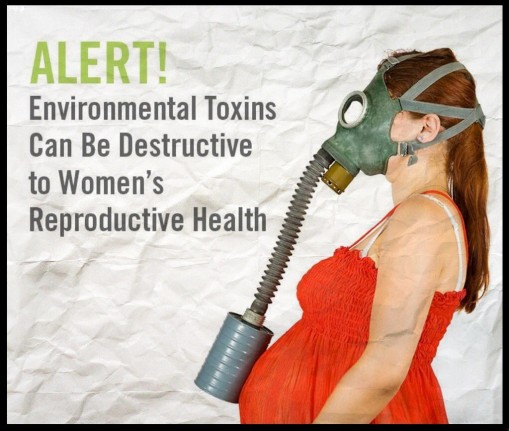Minimize Exposure to Environmental Toxins to Optimize Fertility
Posted by Christina Pistotnik

We are constantly being exposed to environmental toxins on a daily bases however we can take some control back by making lifestyle and environmental changes. By changing some of the products we use we are capable of decreasing our exposure to these harmful toxins that negatively affects our fertility and overall health.
Environmental toxins such as; BPA (Bisphenol A), mercury, dioxins, and phthalates actually disrupts the Endocrine system (system in charge of regulating and distributing reproductive hormones). These toxins pose a risk to fertility because they often mimic, increase, decrease, bind to, or change naturally occurring sex hormones that are needed to be in proper balance for optimal health.
BPA is one of the most troublesome endocrine disruptors because it mimics estrogen fooling the body into thinking it’s the natural version upsetting the normal hormone balance. BPA can be found in many drinking containers, the lining of most food and beverage cans, bottle caps, plastic cutlery, plastic food storage containers, and toys. BPA exposure is especially high when plastics are heated. Therefore use glass or ceramic food contains when heating or storing leftovers and don’t leave store bought bottles of water in a car that’s been sitting in the sun all day.
Mercury is a neurotoxin that can bind to hormones, disrupting ovulation and menstruation. Unfortunately, it is has been found on all fish due to pollution. You don’t have to give up fish altogether but it would be beneficial to limit your intake to deep sea, smaller fish that have a shorter life span due to their lower levels of mercury exposure. Avoid larger fish as they have been exposed to higher levels of mercury for longer periods of time. -See listing of mercury exposure and fish in lifestyle section of blog
Dioxin is a toxic chemical formed during the industrial process and are found in very small amounts in the environment, including air, water, soil and our food supply. Exposure to dioxins has the ability to disrupt the way both male and female sex hormones signaling occur in the body. They have also been associated with poor quality and quantity of sperm. Dioxins tend to concentrate in fatty tissues so eating animal protein in small quantities is best and choose only organically produced dairy, meat, and poultry.
Phthalates found in plastics and personal hygiene products triggers cell death especially to cells located in the testicular region. This means that it is responsible for low sperm counts. Phthalates have also been associated with hormone changes and thyroid irregularities. Again avoid using plastic food containers/wrap and read labels on personal hygiene products and avoid those that list an ingredient as “fragrance” because it could mean that phthalates are hidden under that ambiguous term (see website link for product list in lifestyle section).
Lifestyle changes recommended that limit exposure to environmental toxins:
• Only buy water bottles that are stainless steel or are BPA free, never drink/eat out of plastic containers that have been heated (ie. Bottle of water sitting in a warm car, microwave food in plastic containers), store food in glass or ceramic containers, only purchase plastic wrap that is BPA free, and make fresh food (canned foods have high levels of BPA in their linings).
• Primarily eating fish that are in the very low to low mercury levels section, rarely eat the ones in the moderate section, and never eat the ones in the highest will help decrease elevated exposure to mercury and they are as follows:
- Very Low: Catfish, Mullet, Flounder, fluke, Herring, Anchovies, Pollock, Crayfish, Haddock, Sardine, Salmon, Oyster, Tilapia
- Low: Snapper, Monkfish, Carp, Freshwater perch, Spiny lobster, Boston or Chub Mackerel, Trout, Squid, Whitefish, Crab, Scallop
- Moderate/high: Tuna, Orange Roughy, Marlin, Grouper, Spanish Mackerel, Chilean Seabass, Bluefish, Lobster, Halibut, Sablefish, Striped Bass, Rockfish
- Highest: King mackerel, Swordfish, Tilefish, Shark
• Limit animal protein and only consume organically produced dairy, eggs, meat, and poultry (use lean and skinless cuts of meat/poultry)
• Go through your home room by room and get rid of toxic chemicals:
Plastic wrap (not BPA free), synthetic and toxic cleaning products (replace with natural products), dryer sheets, plastic storage containers (replace with glass, ceramic, or stainless steel, synthetic shampoos, soaps, creams, cosmetics (replace with natural organic products).
To see a list of healthier personal care products go to: http://www.bcaction.org/our-take-on-breast-cancer/environment/safe-cosmetics/phthalate-free-cosmetics/
If you have any questions, please contact us!
